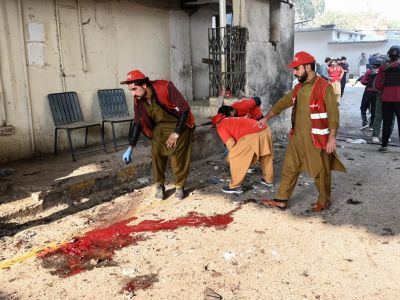A Palestinian resistance fighters killed overnight three Israeli soldiers and wounded at least six others when he stormed an army checkpoint between the Jewish settlements of Morague and Gush Katif in the Gaza Strip, reported Al Jazeera satellite TV channel.
The Palestinian, whose identity was not immediately known, was later killed by the Israeli troops, said the TV report.
The Israeli army blockaded the southern sector of the Gaza Strip Saturday morning after the incident, said AFP.
Meanwhile, Israel said Friday that its army's storming of the flashpoint West Bank city of Hebron was a clear signal it would no longer show "restraint" toward the Palestinians and their 11-month uprising, said reports.
US President George W. Bush, meanwhile, rachetted up the pressure on the Palestinian President, Yasser Arafat, claiming his inability -- or unwillingness -- to halt terrorism was the main reason the peace process was deadlocked, according to AFP.
Israeli tanks raided mainly Palestinian-controlled Hebron early Friday, seriously injuring an 11-year-old Israeli boy and his soldier brother by snipers firing from the Abu Sneina area surrounding a Jewish settlement.
Israeli Defense Minister Binyamin Ben Eliezer later told public television that his government was unwilling to accept any more such attacks.
"This operation signifies that Israel is no longer inclined to show restraint but continues to say to the Palestinians day and night: come back to the negotiating table," the minister was quoted as saying by Haaretz newspaper.
"The Palestinians must know that we will not sit with our arms crossed while they shoot at us or send kamikaze" suicide bombers, he said.
Also, Israeli army West Bank commander, Brigadier General Gershon Yitzhak, warned that if Palestinians continue to fire into the Jewish enclave in Hebron, “the IDF would re-occupy Palestinian-controlled areas overlooking the enclave,” Haaretz said.
Around 400 Jewish settlers live under heavy army protection in the center of Hebron, surrounded by a Palestinian population of some 120,000.
Another senior Israeli official commenting on Hebron characterized the overall situation as a "war" that Israel was intent on winning.
"This operation is a clear message to the Palestinians, which means we are determined to win this war of attrition which was imposed upon us," said Dore Gold, a senior advisor to hardline Prime Minister Ariel Sharon.
During the Hebron operation which lasted several hours, the Israeli army also dynamited two houses which had been frequently used by Palestinian snipers targeting the settlement, and wounded 12 people in the area.
It was one of its deepest incursions into Palestinian territory since the Intifada erupted in late September.
The fighting has left 734 dead, including 566 Palestinians and 146 Israelis, according to AFP estimates.
Questioned by reporters at his Texas ranch on the incursion, Bush appeared sympathetic to the Israeli response, and charged that Arafat had not done enough to halt terrorism to warrant any resumption of the stalled peace talks.
"If Mr. Arafat is interested in having a dialogue ... then I strongly urge him to urge the Palestinian terrorists to stop the suicide bombings, stop the incursions, stop the threats," Bush said, cited by AFP.
His reference to "incursions" in connection with Arafat was not immediately clear, since it is Israel which has been criticized for its raids into areas ceded to Palestinian control under previous peace accords.
But Bush's comments appeared to further dampen hopes of a much-anticipated meeting between Arafat and Israeli Foreign Minister Shimon Peres, agreed to in principle by both sides earlier this week.
No venue or date for that meeting, agreed to after the intervention of German Foreign Minister Joschka Fischer, has yet been set and there are indications that Israel is balking at the talks, the agency said.
AFP reported that Israel's TV network reported late Friday that Peres wanted to postpone the meeting since the current climate of violence made chances of a ceasefire agreement very slim.
In his remarks, Bush said the US goal was still to bring the two sides to the point where they could implement the recommendations of the Mitchell commission, an international panel that called for a series of steps to be taken in order to resume peace talks.
"In order to get to Mitchell, it requires there to be a cessation of terrorist activity," he said. "If not a cessation, a 100-percent effort to get to a cessation and we haven't seen that 100-percent effort yet."
The Palestinians' position appeared to further erode when they were forced to shelve plans at the United Nations for an immediate Security Council resolution after a split emerged among the eight non-aligned council members.
The United States had threatened to veto any action by the council which would be have legally binding consequences for Israel, as it did last March over a draft resolution to send UN observers into the Palestinian territories.
The latest draft resolution included a provision for a "monitoring mechanism," while Israel has repeatedly opposed proposals for foreign observers as an "internationalization" of the conflict.
Also Friday night in the West Bank, some 50,000 Palestinians demonstrated to commemorate Israel's "targeted killing" of six members of the Hamas movement, an attack which also killed two children – Albawaba.com
© 2001 Al Bawaba (www.albawaba.com)









